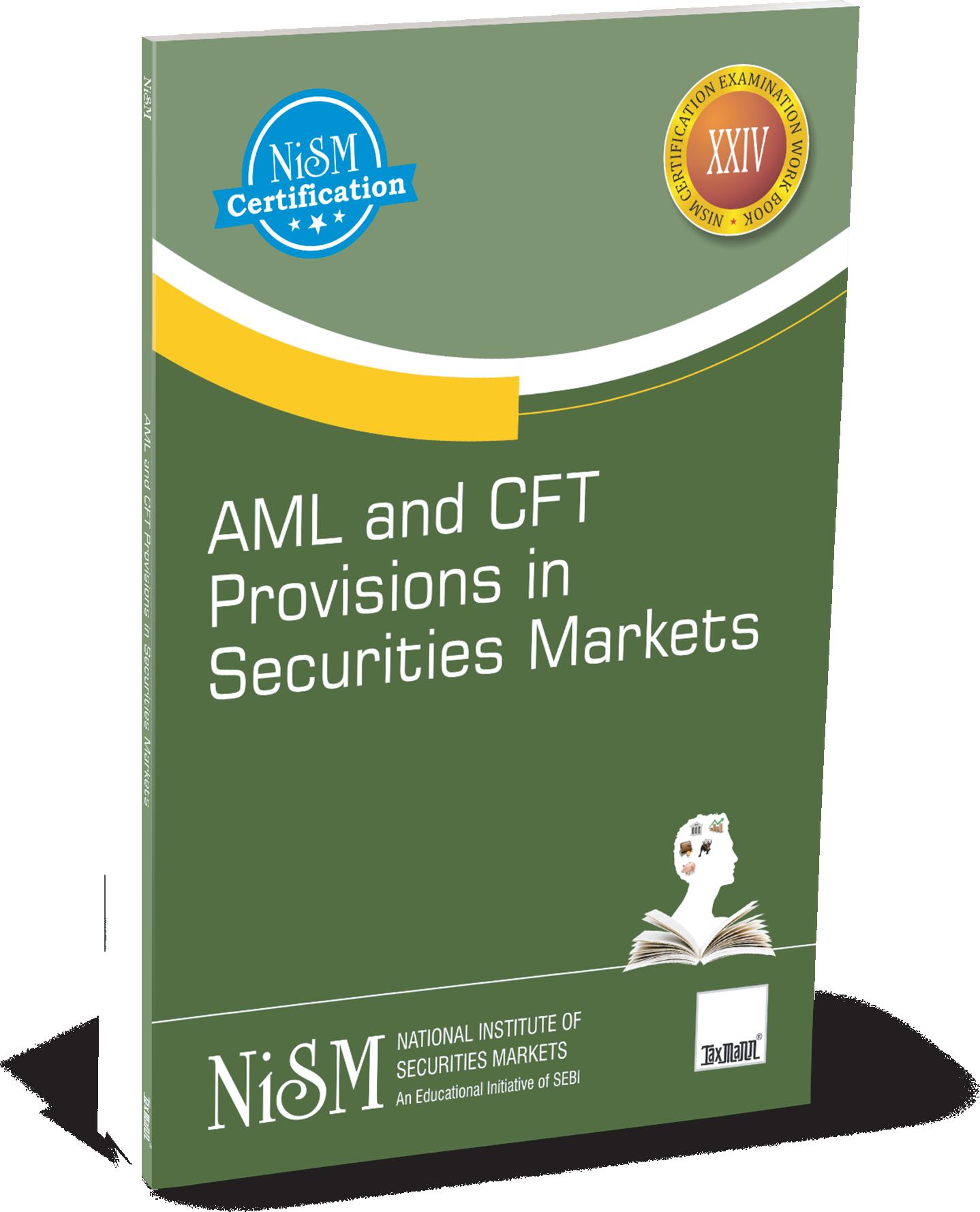© NATIONAL INSTITUTE OF SECURITIES MARKETS, MUMBAI, 2025
PRINTING AND PUBLISHING RIGHTS WITH THE PUBLISHER
All rights reserved. No part of this publication may be reproduced, stored in or introduced into a retrieval system, or transmitted in any form or by any means (electronic, mechanical, photocopying, recording or otherwise), without the prior written permission of National Institute of Securities Markets.
Any person who does any unauthorised act in relation to this publication may be liable to criminal prosecution and civil claims for damages.
While every care has been taken in compiling the information contained in this publication, National Institute of Securities Markets accepts no responsibility for any errors or omissions.
Workbook Version : January 2025
Price : ` 215
Published by :
Taxmann Publications (P.) Ltd.
Sales & Marketing :
59/32, New Rohtak Road, New Delhi-110 005 India
Phone : +91-11-45562222
Website : www.taxmann.com, E-mail : sales@taxmann.com
Mumbai
35, Bodke Building, Ground Floor, M.G. Road, Opp. Railway Station, Mulund (West), Mumbai-400080
Ph : +91-22-25934806, 25934807, 25934809; Mobile : 09322247686, 9619668669, 7045453844/45/48/51
E-mail : sales.mumbai@taxmann.com; nileshbhanushali@taxmann.com
Regd. Office : 21/35, West Punjabi Bagh, New Delhi-110 026 India
Printed at : Tan Prints (India) Pvt. Ltd.
44 Km. Mile Stone, National Highway, Rohtak Road, Village Rohad, Distt. Jhajjar (Haryana) India
E-mail : sales@tanprints.com
DISCLAIMER
The contents of this publication do not necessarily constitute or imply its endorsement, recommendation, or favoring by the National Institute of Securities Markets (NISM) or the Securities and Exchange Board of India (SEBI). This publication is meant for general reading and educational purpose only.
The statements/explanations/concepts are of general nature and may not have taken into account the particular objective/move/aim/need/circumstances of individual user/reader/organization/institute. Thus NISM and SEBI do not assume any responsibility for any wrong move or action taken based on the information available in this publication.
Therefore before acting on or following the steps suggested on any theme or before following any recommendation given in this publication user/reader should consider/seek professional advice.
The publication contains information, statements, opinions, statistics and materials that have been obtained from sources believed to be reliable and the publishers of this title have made best efforts to avoid any errors. However, publishers of this material offer no guarantees and warranties of any kind to the readers/users of the information contained in this publication.
Since the work and research is still going on in all these knowledge streams, NISM and SEBI do not warrant the totality and absolute accuracy, adequacy or completeness of this information and material and expressly disclaim any liability for errors or omissions in this information and material herein. NISM and SEBI do not accept any legal liability what-so-ever based on any information contained herein.
While the NISM Certification examination will be largely based on material in this workbook, NISM does not guarantee that all questions in the examination will be from material covered herein.
CHAPTER 3
CHAPTER 4
SCHEDULED OFFENCES
SEBI GUIDELINES FOR KYC NORMS IN SECURITIES MARKET
Learning Objective:
After studying this chapter, you should know about:
The KYC guidelines and process to be followed by every SEBI registered intermediary to obtain and verify the Proof of Identity (PoI) and Proof of Address (PoA) from the client at the time of commencement of an accountbased relationship.
7.1 SEBI guidelines for KYC norms
KYC and Client Due Diligence (CDD) policies as part of KYC are the foundation of an effective Anti-Money Laundering process. The KYC process requires every SEBI registered intermediary to obtain and verify the Proof of Identity (PoI) and Proof of Address (PoA) from the client at the time of commencement of an account-based relationship.
The registered intermediaries shall not open or keep any anonymous account or account in fictitious names or account on behalf of other persons whose identity has not been disclosed or cannot be verified. The intermediaries shall also continue to abide by circulars issued by SEBI from time to time for prevention of money laundering.
7.1-1 Uniform KYC Format
SEBI registered intermediaries shall perform KYC in securities market through physical mode/digital (online or app based) mode. To bring about uniformity in securities
SEBI GUIDELINES FOR KYC NORMS IN SECURITIES MARKET
market, all SEBI registered intermediaries shall use the same KYC form and supporting documents.
The account opening form (AOF) for client shall be divided into two parts.
(
a) Part I of the AOF shall be the KYC form which shall capture the basic details about the client. For this purpose, all registered intermediaries shall use the KYC templates provided by Central Registry of Securitisation Asset Reconstruction and Security Interest of India (CERSAI) for individuals and for legal entities for capturing the KYC information. The CKYCR templates - Individual and Legal Entity provided by CERSAI is available at https://www.ckycindia.in/ ckyc/?r=download.
(
b) Part II of the form shall obtain the additional information specific to the area of activity of the intermediary, as considered appropriate by them. The instant Master Circular deals with the provisions of Part I -KYC form.
While performing the KYC Process in Securities Market, the registered intermediaries shall abide by the following requirements/exemptions for effective implementation of Anti-Money Laundering process.
7.1-2 Requirement of Permanent Account Number (PAN)
In order to strengthen the KYC norms and identify every participant in the securities market with their respective PAN thereby ensuring sound audit trail of all the transactions, PAN shall be the unique identification number for all participants transacting in the securities market, irrespective of the amount of transaction.
The registered intermediaries shall verify the PAN of their clients online at the Income Tax website without insisting on the original or copy of PAN card. As per the provisions of Income-tax Act, 1961 (Income Tax Act), the PAN allotted to a person shall become inoperative if it is not linked with Aadhaar. Since PAN is the key identification number and part of KYC requirements for all transactions in the securities market, all registered intermediaries shall ensure valid PAN in the KYC documentation for all clients. Status of Aadhaar and PAN linkage shall be flagged at the system of KRA.
7.1-3 Exemptions/Clarifications to PAN requirements
The following are exempted from the mandatory requirement of PAN:
SEBI GUIDELINES FOR KYC NORMS IN SECURITIES MARKET
vii. any other document as notified by the Central Government in consultation with the Regulator.
b. Further, in terms of proviso to the above Rule, where simplified measures are applied for verifying the identity of the clients, the following documents shall also be deemed to be officially valid document:
i. Identity card/document with applicant’s photo, issued by the Central/ State Government Departments, Statutory/Regulatory Authorities, Public Sector Undertakings, Scheduled Commercial Banks and Public Financial Institutions;
ii. Letter issued by a gazetted officer, with a duly attested photograph of the person.
7.1-5 Proof of Address (PoA) - List of documents admissible
The following documents shall be accepted as PoA:
a. “Officially valid document” defined as per Rule 2(d) of Prevention of MoneyLaundering (Maintenance of Records) Rules, 2005 (PML Rules):
i. the passport;
ii. the driving licence;
iii. proof of possession of Aadhaar number;
iv. the Voter’s Identity Card issued by Election Commission of India;
v. job card issued by NREGA duly signed by an officer of the State Government;
vi. the letter issued by the National Population Register containing details of name, address; or
vii. any other document as notified by the Central Government in consultation with the Regulator.
b. Further, in terms of Rule 9(18) of PML Rules, 2005, in case the officially valid document furnished by the client does not contain updated address, the following documents (or their equivalent e-documents thereof) shall be as deemed to be officially valid document for the limited purpose of proof of address, provided that the client shall submit updated officially valid document
(or their equivalent e-documents thereof) with current address within a period of three months of submitting the following documents:
i. utility bill which is not more than two months old of any service provider (electricity, telephone, post-paid mobile phone, piped gas, water bill);
ii. property or municipal tax receipt;
iii. pension or family pension payment orders (PPOs) issued to retired employees by Government Departments or Public Sector Undertakings, if they contain the address;
iv. letter of allotment of accommodation from employer issued by state or central government departments, statutory or regulatory bodies, public sector undertakings, scheduled commercial banks, financial institutions and listed companies and leave and licence agreements with such employers allotting official accommodation.
In terms of the PML Rules, cases where the client submits his proof of possession of Aadhaar number as an officially valid document, he may submit it in such form as is issued by the UIDAI. A document shall be deemed to an officially valid document even if there is a change in the name subsequent to its issuance provided it is supported by a Marriage Certificate issued by the State Government or a gazette notification, indicating such change of name.
For non-residents and foreign nationals, (allowed to trade subject to RBI and FEMA guidelines), copy of passport/Persons of Indian Origin (PIO) Card/Overseas Citizenship of India (OCI) Card and overseas address proof is mandatory. In case the officially valid document presented by a foreign national does not contain the details of address, the documents issued by the Government departments of foreign jurisdictions and letter issued by the Foreign Embassy or Mission in India shall be accepted as proof of address. If any proof of address is in a foreign language, then translation into English shall be required. If correspondence and permanent address is different, then proof for both shall be submitted.
7.1-6 Acceptance of third party address as correspondence add
Registered intermediaries at the time of commencement of an account based relationship shall determine whether the client purports to act on behalf of juridical person or
SEBI GUIDELINES FOR KYC NORMS IN SECURITIES MARKET
individual or trust and the registered intermediary shall verify that any person purporting to act on behalf of such client is so authorized and verify the identity of that person. A client can authorize to capture address of a third party as a correspondence address, provided that all prescribed ‘Know Your Client’ norms are also fulfilled for the third party. The intermediary shall obtain proof of identity and proof of address for the third party. The intermediary shall also ensure that client due diligence norms as specified in Rule 9 of PML Rules are complied with in respect of the third party.
7.1-7 Identification of Beneficial Ownership
SEBI Master Circular SEBI/HO/MIRSD/MIRSDSECFATF/P/CIR/2024/78 dated June 06, 2024 on Guidelines on Anti-Money Laundering (AML) Standards and Combating the Financing of Terrorism (CFT)/Obligations of Securities Market Intermediaries under the Prevention of Money Laundering Act, 2002 and Rules framed there under has prescribed the approach to be followed towards identification of beneficial ownership. Accordingly, the registered intermediaries may be guided by the provisions of the said Master Circular and amendments thereto for the purpose of identification of beneficial ownership of the client.
Whenever it is apparent that the securities acquired or maintained through an account are beneficially owned by a party other than the client, that party shall be identified using client identification and verification procedures.
The registered intermediaries shall conduct ongoing CDD where inconsistencies are noticed in the information provided. The underlying objective shall be to follow the requirements enshrined in the PMLA, PML Rules, SEBI Act and Regulations, directives and circulars issued thereunder so that the intermediary is aware of the clients on whose behalf it is dealing. The registered intermediaries shall periodically update all documents, data or information of all clients and beneficial owners collected under the CDD process.
The stock exchanges and depositories shall monitor the compliance of the aforementioned provision on identification of beneficial ownership through half yearly internal audits. In case of mutual funds, compliance of the same shall be monitored by the Boards of the Asset Management Companies and the Trustees and in case of other registered intermediaries, by their Board of Directors.
SEBI GUIDELINES FOR KYC NORMS IN SECURITIES MARKET
b. Copy of Trust deed.
c. Copy of the balance sheet for the last financial year (initially for the last two financial years and subsequently for every last financial year).
d. List of trustees certified by managing trustees/CA.
e. Photograph, POI, POA, PAN of Trustees.
iv. HUF:
a. Deed of declaration of HUF/List of coparceners.
b. Bank pass-book/bank statement in the name of HUF.
c. Photograph, POI, POA, PAN of Karta.
v. Unincorporated association or a body of individuals:
a. Proof of Existence/Constitution document.
b. Resolution of the managing body & Power of Attorney granted to transact business on its behalf.
c. Authorized signatories list with specimen signatures.
vi. Banks/Institutional Investors:
a. Copy of the constitution/registration or annual report/balance sheet for last financial year (initially for the last two financial years and subsequently for every last financial year).
b. Authorized signatories list with specimen signatures.
vii. Army/Government Bodies:
a. Self-certification on letterhead.
b. Authorized signatories list with specimen signatures.
viii. Registered Society:
a. Copy of Registration Certificate under Societies Registration Act.
b. List of Managing Committee members.
c. Committee resolution for persons authorised to act as authorised signatories with specimen signatures.
d. True copy of Society Rules and Bye Laws certified by the Chairman/ Secretary.
7.1-9 Requirement of Mobile Number and Email ID
The registered intermediaries shall upload the details of mobile number and email address on the KRA system. It shall be ensured that the mobile number/email addresses of their employees/authorized persons, distributors etc. are not uploaded on behalf of clients.
7.1-10 Digital KYC
In order to enable the online KYC process for establishing account-based relationship with the registered intermediary, client’s KYC shall be completed through digital (online/Application (App) based) KYC, in person verification through video, online submission of officially valid document/other documents, using electronic/digital signature, including Aadhaar e-Sign:
i. The client shall visit the website/App/digital platform of the registered intermediary and fill up the online KYC form and submit requisite documents.
ii. SEBI registered intermediaries shall obtain the express consent of the client before undertaking online KYC.
iii. The PAN, name, photograph, address, mobile number and email ID of the client shall be captured digitally and officially valid document shall be provided as a photo/scan of the original under electronic/digital signature, including Aadhaar e-Sign and the same shall be verified.
iv. Any officially valid document other than Aadhaar shall be submitted through Digilocker/using electronic/digital signature, including Aadhaar eSign.
v. The mobile number of client accepted as part of KYC should preferably be the one seeded with Aadhaar.
vi. Mobile and email shall be verified through One Time Password (OTP) or other verifiable mechanism.
vii. Aadhaar shall be verified through UIDAI’s authentication/verification mechanism. Further, in terms of PML Rule 9(16), every intermediary shall, where the client submits his Aadhaar number, ensure that such client redacts or blacks out his Aadhaar number through appropriate means where the authentication of Aadhaar number is not required under sub-rule (15) under PML Rule.









